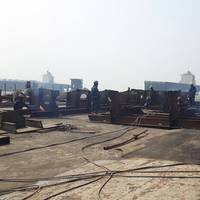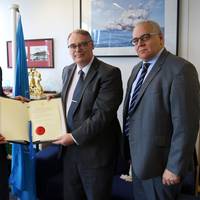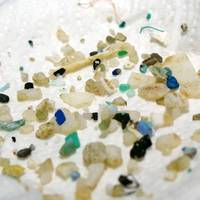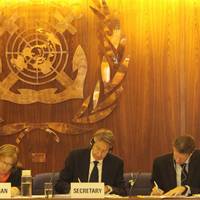Protecting Marine Life from Ship Noise
Ship noise has been shown to be the main contributor to underwater noise on a global scale, with recognized negative impacts on marine life, said a press release from International Maritime Organization (IMO). Scientists and researchers from international organizations, States and expert groups have been sharing the latest information on ocean noise, including its detrimental impact on species such as whales and dolphins, at the informal annual meeting on oceans and the law of the sea, at United Nations headquarters, New York, United States (18-22 June). The theme for this year’s meeting is "Anthropogenic underwater noise". IMO’s Stefan Micallef and Fredrik Haag outlined IMO’s work to date on ship noise.
New Global Ocean Institute Inaugurated
International Maritime Organization (IMO) Secretary-General Kitack Lim attended the inauguration of the new maritime and ocean policy research institute at the World Maritime University (WMU) in Malmö, Sweden (8 May). Lim, who is also Chancellor of WMU, said that the establishment of the WMU-Sasakawa Global Ocean Institute was of great strategic importance for IMO and, indeed, for all those who seek to advance the global ocean agenda. “The Global Ocean Institute will further WMU’s distinguished legacy of educating maritime and oceans leaders who have the knowledge and responsibility to affect change in their home countries and who will contribute to the global conservation and sustainable use of the ocean,” Lim said.
Africa Maritime Cooperation Centre Launched
Africa has launched its maritime technology cooperation centre as part of an ambitious International Maritime Organization (IMO)-EU project to establish a global network of centres to further global efforts in addressing climate change. The centres will act as regional focal points for a wide range of activities including improving compliance with existing and future international energy-efficiency regulations; promoting uptake of low-carbon technologies and operations in maritime transport, and establishing voluntary pilot data-collection and reporting systems to feed back into the global regulatory process. In doing so, they will play their part in supporting the United Nations Sustainable Development Goals (SDGs).
IMO Support for Ship Recycling in Bangladesh
The second phase of an International Maritime Organization (IMO)-implemented project to enhance safe and environmentally sound ship recycling in Bangladesh is set to begin in January, following a US$1.1 million funding agreement with Norway. The two-year project will build on the first phase of the Safe and Environmentally Sound Ship Recycling in Bangladesh (SENSREC) project, which resulted in economic and environmental studies on ship recycling in Bangladesh, the development of training materials and capacity building plans and a preliminary design for infrastructure including facilities for treatment, storage and disposal of hazardous wastes generated from recycling operations.
IMO Updates COP23 on Climate Change Work
The progress made in starting to shape a draft comprehensive International Maritime Organization (IMO) strategy on reduction of GHG emissions from ships has been reported to the COP 23 climate change conference, meeting in Bonn, Germany (6-15 November) by IMO’s Stefan Micallef. He reported that more than 2,600 ocean-going ships have now been certified to the mandatory energy efficiency design requirements, which have been in force since 2013. The significant global reduction in the sulphur content of the fuel oil used by ships from 1 January 2020 is expected to contribute further to the reduction of GHG emissions from ships, through the anticipated resulting uptake of alternative fuels.
Collaboration for Future Ready Shipping
"No stakeholder, alone, can deal with the complexities the planet faces in addressing the challenge of climate change", said International Maritime Organization (IMO)'s Director of the Marine Environment Division, Stefan Micallef. He was opening the joint Singapore-IMO International Conference on Maritime Technology Transfer and Capacity-Building also known as Future-Ready Shipping Conference 2017, held in Singapore (25-26 September). The Conference looked at future collaborations that can drive discussions towards identifying opportunities that can have an impact on the shipping industry as it moves towards decarbonization. The event also included sessions covering the latest trends in maritime and port energy efficient technologies…
International Efforts to Reduce GHG Emissions
Close to 240 maritime leaders and professionals will gather in Singapore to identify priority areas for international action and exchange best practices in maritime technology transfer and capacity building at the Future-Ready Shipping 2017 Conference. Jointly organised by the Maritime and Port Authority of Singapore (MPA) and the International Maritime Organization (IMO), the conference will take place from 25th to 26th September 2017 at the Grand Copthorne Waterfront Hotel. Future-Ready Shipping 2017 is the second edition in the conference series which pioneered a global dialogue on maritime technology cooperation. The first, also held in Singapore in 2015…
From GloBallast to GloFouling Partnerships
Global Environment Facility (GEF) approves new project concept to address major aquatic invasive species vector. A new global project to help protect marine ecosystems from the negative effects of invasive aquatic species has been given the go-ahead for preparation. The GloFouling Partnerships project – a collaboration between the Global Environment Facility (GEF), the United Nations Development Programme (UNDP) and the International Maritime Organization (IMO) – will address the transfer of aquatic species through biofouling, in other words, the build-up of aquatic organisms on a ship’s underwater hull and structures. The project will focus on the implementation of the IMO Guidelines for the control and management of ships’ biofouling…
GloBallast Story Published at UN Ocean Conference
During the 20th century, tiny organisms carried in the ballast water of ships began to be recognized as alien invasive species. These aquatic species were hitching a ride across the oceans and some were embedding themselves in new areas, multiplying and becoming harmful invasive aquatic species. The impacts on native species, local ecosystems and sea-based economies have, in some cases, been devastating. The story of how global partnerships, governments, industry, academia and other stakeholders came together to tackle this problem is told in a new publication, The GloBallast Story, launched (6 June) during a side event at the UN Ocean Conference in New York.
IMO Catalyst for More Efficient Ships
"International Maritime Organization (IMO) regulations will be a driver and catalyst for a generation of new, more efficient ships" said Stefan Micallef, Director of the Marine Environment Division at IMO, as he concluded his remarks at the 2017Propulsion and Emissions conference, Hamburg, Germany (10-11 May). The ‘Future proofing your fleet’ event discussed challenging issues of complying with environmental regulations and the associated costs. In his keynote address, Micallef also touched upon key IMO issues such as CO2 emissions reduction policies, noting the successful introduction of the EEDI, which is forecast to cut CO2 emissions by 1.3 gigatonnes, or 3.6% of total global emissions, by 2050.
Project to Address Marine Bio-invasions Concludes
A decade-long project to promote implementation of an international treaty stemming the transfer of potentially invasive species in ships’ ballast water has reached a successful conclusion at a meeting of stakeholders from Governments, industry and UN bodies. The International Maritime Organization (IMO) has been executing the GloBallast Partnerships Program in collaboration with the Global Environment Facility (GEF) and the United Nations Development Programme (UNDP). The project was launched in 2007 after an initial 4-year phase and has been assisting developing countries to reduce the transfer of harmful aquatic organisms and pathogens in ships’ ballast water and implement the IMO Ballast Water Management (BWM) Convention.
Caribbean Centre Launches on Low-Carbon Shipping Mission
A new centre tasked with promoting technologies and operations to help navigate shipping into a low-carbon future has been launched at the University of Trinidad and Tobago (8 March). The centre will cater to the needs of the Caribbean region under the Global Maritime Technology Cooperation Centre Network (GMN) – a project funded by the European Union (EU) and run by International Maritime Organization (IMO). The GMN initiative unites carefully selected technology centres into a global network focused on supporting developing countries in activities including development of national energy-efficiency policies for their maritime sectors.
Bangladesh Targets Better Ship Recycling Practices

With an annual gross tonnage capacity of more than 8.8 million, Bangladesh’s ship recycling industry is one of the world’s largest, second only to neighboring India in terms of volume. But for these countries ship recycling practices have long been a matter of concern, particularly in terms of safety and environmental sustainability. Now on the heels of completing its first phase of a project aiming to improve standards within the nation’s ship recycling industry, the Government…
More Plastic than Fish in the Ocean
Did you know that by 2050 there could be more plastics in the ocean than fish, if human habits don’t change? India Clean Seas Conference taking place in Goa, India (22-24 September), discussed what needs to be done to keep the oceans clean. IMO’s Director of Marine Environment, Stefan Micallef delivered the opening address, highlighting daunting environmental challenges facing the oceans and how to develop sustainable solutions. Micallef pointed out how IMO’s marine pollution convention MARPOL has played a key role as a comprehensive, international treaty covering the prevention of both marine and atmospheric pollution by ships. To address the massive accumulation of plastics in the ocean…
UK First to Accept Marine Geoengineering Amendments
The United Kingdom has become the first State to formally accept the 2013 marine geoengineering amendments to the 1996 “London Protocol”, the treaty covering dumping of wastes at sea. The amendments support the precautionary approach by providing for specific marine geoengineering activities to be permitted only when the activity is assessed as constituting legitimate scientific research. Currently, only ocean fertilization for research purposes may be permitted. Meanwhile, the marine scientific expert group GESAMP is currently undertaking a comprehensive study on marine geoengineering to better understand the potential impacts of proposed marine geoengineering techniques on the marine environment – including social and economic consequences.
UK First to Accept Marine Geoengineering Amendments

The United Kingdom has become the first state to formally accept the 2013 marine geoengineering amendments to the 1996 “London Protocol”, the treaty covering dumping of wastes at sea. The amendments support the precautionary approach by providing for specific marine geoengineering activities to be permitted only when the activity is assessed as constituting legitimate scientific research. Currently, only ocean fertilization for research purposes may be permitted. Meanwhile, the…
EC Funding Gives Green Light to IMO Energy-Efficiency Project
Network of regional maritime technology cooperation centres to be established through €10 million funding contribution. An ambitious IMO project to establish a global network of Maritime Technology Cooperation Centres (MTCCs) in developing countries is to go ahead thanks to a €10 million funding contribution from the European Commission (EC). The funds mobilised by the EC illustrate the EU's commitment to support the concrete implementation of a range of measures aimed at addressing energy efficiency and shipping emissions and, through this, contributing to the fight against climate change. This IMO energy-efficiency project is part…
Ocean’s Micro-plastics as Harmful as Plastic Bags -Report

Tiny pieces of plastic or fibers, known as Micro-plastics, may act as a pathway for persistent, bio accumulating and toxic substances entering the food chain, and are increasingly being found in the oceans and may prove to be as harmful to marine life as more obvious, larger debris, such as plastic bags, according to a new report. The report, Sources, fates and effects of microplastics in the marine environment - a global assessment, has been published by the Joint Group of Experts on the Scientific Aspects of Marine Environmental Protection (GESAMP)…
Development on BWM highlights - IMO's R&D Forum
Ballast water management experts, meeting at the recent IMO-GloBallast R&D Forum in Canada, have showcased the latest developments in ballast water management and highlighted the areas where further research is needed, in order to prevent the spread of potentially harmful species in ballast water. Some 140 participants from IMO Member States, academia, private sector, testing facilities and the maritime technology industry were meeting at the International Civil Aviation Organization (ICAO) in Montreal, Canada, for the 6th Global Environment Facility (GEF)-United Nations Development Program (UNDP)-IMO GloBallast R&D Forum and Exhibition on Ballast Water Management (16-18 March 2016), under the banner “Ballast Water Management Convention – moving towards implementation”.
GloMEEP Project Forges Ahead with Train-the-Trainer Workshop
A global Train-the-Trainer workshop on energy efficiency has been delivered in China (23-27 May), preparing the personnel needed to cascade knowledge on energy efficiency for ships and related efforts for mitigation of greenhouse gas emissions from international shipping. The five-day intensive course was organized by the International Maritime Organization (IMO), within the framework of the Global Maritime Energy Efficiency Partnerships (GloMEEP) Project. The workshop was co-hosted by the China Maritime Safety Administration (China MSA) and Dalian Maritime University (DMU). The GloMEEP Project aims to support increased uptake and implementation of energy-efficiency measures for shipping. China is one of the ten Lead Pilot Countries implementing the GloMEEP Project.
Together Towards Cleaner Oceans
International Maritime Organization (IMO) is contributing to a United Nations meeting covering marine debris, plastics and microplastics in New York (13-17 June). Discussions are focusing on information exchange between key players involved in the protection of the marine environment – in the context of the 1982 United Nations Convention on the Law of the Sea (UNCLOS), which establishes rules governing all uses of the oceans and their resources. IMO’s Stefan Micallef, Director of the Marine Environment Division, took part in a panel on the environmental, social and economic dimensions of marine debris, plastics and microplastics. He provided an overview of the progress made in preventing…
Marine Geo-engineering to be Regulated

Marine geo-engineering, including ocean fertilization, will be regulated under amendments to the 1996 Protocol to the international treaty which regulates the dumping of wastes and other matter at sea. The amendments, adopted recently by Parties to the 1996 Protocol to the Convention on the Prevention of Marine Pollution by Dumping of Wastes and Other Matter, 1972, add a new article 6bis which states that “Contracting Parties shall not allow the placement of matter into the sea from vessels…
Sustainable Use of the Oceans
International Maritime Organization (IMO) will have an important contribution to make to the UN 2017 Oceans Conference, which is being co-hosted by Fiji and Sweden from 5 to 9 June 2017. It has aims to support the implementation of Sustainable Development Goal 14 (Conserve and sustainably use the oceans, seas and marine resources for sustainable development). Through the development of global standards to ensure shipping does not adversely impact the environment and through its extensive technical cooperation programme, IMO supports the aims and objectives of SDG 14. Preparations for the 2017 Oceans Conference were discussed when Stefan Micallef, IMO’s Director, Marine Environment Division, met the representative of the co-host, H.E.





